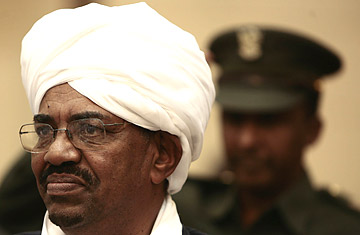
Sudanese President Omar Hassan al- Bashir.
Sudanese President Omar Hassan al-Bashir is, officially, a wanted man. On March 4, the International Criminal Court issued an arrest warrant for the 65-year-old on charges of war crimes and crimes against humanity in Darfur — the first warrant ever issued by the court for a sitting head of state.
A panel of three judges in The Hague accused al-Bashir of personal responsibility for murder, extermination, rape and other crimes in the country's western province, where an estimated 300,000 people have been killed and millions displaced since 2003. The judges did not find enough evidence to charge him with genocide, as the court prosecutor sought, though the charge could be added later. Al-Bashir's government denies ordering civilians to be killed. (See pictures of Darfur descending into chaos.)
Many human rights observers welcomed the prospect of justice for the country's often ruthless leader, though others worry that weakening the President could plunge Africa's largest country into chaos and endanger a shaky truce in its bloody civil war. In apparent retaliation, Sudan swiftly revoked licenses allowing Oxfam and other aid groups to operate in Darfur. (See pictures of Sudan's slow-motion tragedy.)
The odds of al-Bashir actually appearing in the docks appear remote. The ICC has no police force or military to carry out warrants, and U.N. peacekeepers in the country lack the mandate to seize war crimes suspects. Sudan's ambassador to the U.N. shrugged off the news, saying "For us, the ICC doesn't exist."
Facts:
• Born in a farming community in 1944 in a rural area north of the Sudanese capital of Khartoum.
•Studied at military academies in Cairo and Khartoum, later fighting against Israel as an Egyptian army paratrooper in the Yom Kippur War of 1973.
•Led a bloodless coup in 1989 known as "the Salvation Revolution" to topple then-Prime Minister Sadiq al-Mahdi. He suspended political parties and trade unions, and instituted Islamic law in much of the country.
•Appointed himself President in 1993, returning Sudan to civilian rule, and won a presidential election in 1996 — as the only candidate.
• Has two wives but no children of his own. Married his second wife after the death of her husband, a Sudanese military hero. Little else is known about his private life.
•Considered a pragmatist who cooperates with the West when he must. He's loosened the country's economy to take advantage of oil production, and established strong trading ties with China and Russia.
•Accused former President Bill Clinton of ordering the 1998 destruction of a Sudanese pharmaceutical plant as a way to distract attention from the Monica Lewinsky scandal. The plant was believed to be a chemical weapons facility, and the missile strike was ordered two weeks after the bombings of two U.S. embassies in Africa.
•Agreed to a truce to end Sudan's brutal north-south civil war in 2005 by granting some autonomy to southern Sudan. A referendum on secession is slated for 2011.
•Denies supporting aggression by Arab militias against non-Arab rebel groups in Darfur and claims foreigners have "fabricated and exaggerated" the conflict. He has said rape is not "in the Sudanese culture."
•Expected to stand for re-election in 2009.
Quotes from al-Bashir:
• "They will issue their decision tomorrow, and we are telling them to immerse it in water and drink it."
— Dismissing the impending ICC arrest warrant with an Arabic insult
AP, March 3, 2009
• "Yes, there have been villages burned, but not to the extent you are talking about. People have been killed because there is war. It is not in the Sudanese culture or people of Darfur to rape. It doesn't exist. We don't have it."
— On the conflict in Darfur
NBC News, March 20, 2007
• "There are elements in the United States that want political change in Sudan. Some groups in the U.S. Congress, for example, are hostile to us, and whatever we do, we are unacceptable and would never be acceptable to them."
— The Arabic newspaper Asharq Alawsat, Feb 17, 2007
Quotes about al-Bashir:
• "After three years I have strong evidence that al-Bashir is committing a genocide. I cannot be blackmailed; I cannot yield. Silence never helped the victims. Silence helped the perpetrators. The prosecutor should not be silent."
—Luis Moreno-Ocampo, International Criminal Court prosecutor
CNN, July 14, 2008
•"If they arrest him today, it will be good. The people of Sudan have suffered so much."
—"B Kajabier," the assumed name of a Sudanese army deserter who says he was ordered to kill and rape civilians in Darfur
The Guardian, March 4, 2009
•"He is a pigeon, not a hawk."
—Ghazi Suleiman, a Sudanese human rights lawyer, claiming that al-Bashir is more moderate than others in his party
New York Times, July 27, 2008
•"He's a man for whom dignity and pride are very important and he's a man who's quite hot-headed — prone to angry outbursts, especially when he feels his pride has been wounded."
—Sudan analyst Alex de Waal of Harvard University
BBC Online, March 4, 2009
